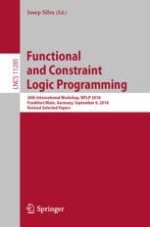2019 | OriginalPaper | Buchkapitel
Reference Type Logic Variables in Constraint-Logic Object-Oriented Programming
verfasst von : Jan C. Dageförde
Erschienen in: Functional and Constraint Logic Programming
Aktivieren Sie unsere intelligente Suche, um passende Fachinhalte oder Patente zu finden.
Wählen Sie Textabschnitte aus um mit Künstlicher Intelligenz passenden Patente zu finden. powered by
Markieren Sie Textabschnitte, um KI-gestützt weitere passende Inhalte zu finden. powered by

 is not declared explicitly in the given interface, the Java language specification implicitly augments interfaces with abstract methods that correspond to every method that is declared in
is not declared explicitly in the given interface, the Java language specification implicitly augments interfaces with abstract methods that correspond to every method that is declared in
 [
[ that is consistent with the corresponding declaration in
that is consistent with the corresponding declaration in
 .
. ). Therefore, this set is finite.
). Therefore, this set is finite.